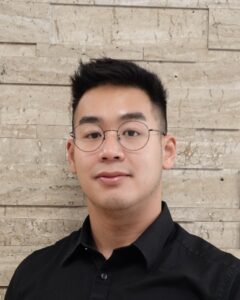 Michener students usually begin their programs with a career goal in mind. But for second-year ultrasound student Adrian Chee, his Michener education isn’t about finding a job — it’s about advancing the profession.
Michener students usually begin their programs with a career goal in mind. But for second-year ultrasound student Adrian Chee, his Michener education isn’t about finding a job — it’s about advancing the profession.
With a PhD in engineering, Adrian works as a Research Assistant Professor at the University of Waterloo with a specialty in biomedical ultrasound. His focus is improving ultrasound imaging through new hardware and data solutions that will lead to better patient diagnosis.
Part of Adrian’s role at the University of Waterloo is to fill the gaps between what imaging researchers are designing and what’s needed in the clinical setting. Under the recommendation of his manager at Waterloo, Adrian applied to Michener’s ultrasound program in 2022 to immerse himself in the hands-on work of a sonographer.
“My job is to solve problems on the research end, but our team doesn’t have the exposure to the clinical or diagnosis side,” says Adrian. “I wanted clinical experience so I could understand the practice of a sonographer. This will inform my team’s technology research at Waterloo.”
Adrian is currently doing his ultrasound clinical placement at Toronto General Hospital, where he’s able to observe and practice alongside professionals in a real clinical setting. For Adrian, this experience is the key to his research and the best way to learn what equipment sonographers actually need in the field.
“The pieces are coming together for me. As someone who had no previous experience with patients, I see that the human side is so important. I’m exposed to complicated cases and new scanning techniques in my placement, but I’m also learning ways to make a patient feel safe,” says Adrian.
Adrian will return to his role at Waterloo when he graduates next year from Michener’s ultrasound program as a trained sonographer. This experience has changed the way he understands ultrasound from the clinical perspective, giving him the insight needed to develop tools for the future of ultrasound imaging and build better communication between research and clinics.
“I’m bringing what I’ve learned at Michener back to my research job,” he says. “As a researcher, I know the problems that sonographers face, but my experience at Michener has showed me the solutions — something I would not have gained without this education.”